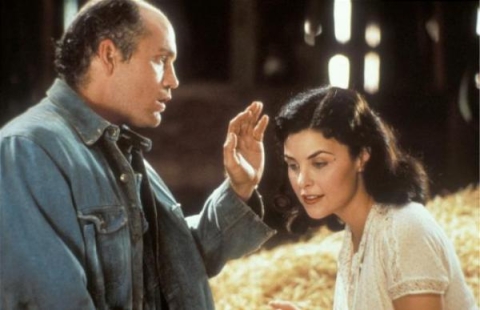 In last week's blog response, I asked you to select a theme that "hit home" with you the most. Now that you have set your sights on a theme you would most like work with some more, it is time to test your skills of analysis. Scan through the last chapter (6) in Of Mice and Men and see if you can pull out a moment from the text that, upon close reading, says something about your selected theme.
In last week's blog response, I asked you to select a theme that "hit home" with you the most. Now that you have set your sights on a theme you would most like work with some more, it is time to test your skills of analysis. Scan through the last chapter (6) in Of Mice and Men and see if you can pull out a moment from the text that, upon close reading, says something about your selected theme.For example, imagine that I am a student who was most interested in the theme of "The American Dream." When scanning chapter 6 I came across this moment in the text:
"A water snake glided smoothly up the pool, twisting its periscope head from side to side; and it swam the length of the pool and came to the legs of a motionless heron that stood in the shallows. A silent head and beak lanced down and plucked it out by the head, and the beak swallowed the little snake while its tail waved frantically."
Next, try to analyze how this moment is somehow connected to the theme you have chosen. It might sound something like:
One of the final images of setting that Steinbeck offers us in Of Mice and Men involves a snake being eaten unexpectedly by a taller, silent bird. The snake "gliding smoothly up the pool" is similar to an American citizen in the 1930s attempting to work their way towards a goal of prosperity. The snake moves its way around obstacles as it sees them, just like a hardworking citizen has to jump some hurdles in the pursuit of their dream. However, the unfortunate truth of the matter is that "The American Dream" is beyond the grasp of most people because of unforeseen enemies to their progress. The tall heron might be a symbol for the more powerful upper or dominant class of society silently waiting in the shadows. The heron ultimately swallows the snake, and in the same light, many Americans dreams are snatched from American people in ways that they do not suspect.
"Well he's sick of you," said the rabbit. "He's gonna beat the hell outta you an' then go away an' leave you"
This took place when Lennie was alone by the Salinas River. He was hearing the things and people speaking in his voice about how George would feel if he found out what he had did. This quote from Of Mice and Men shows the power that George possesses and the powerlessness of Lennie.




